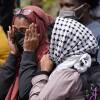A grand jury decision not to charge the officers involved in the killing of Breonna Taylor resonated from Louisville, Kentucky to Boston on Friday night, as hundreds of people gathered in the streets in protest.
Protesters in Nubian Square characterized the killing of Taylor as a metric for society.
"Black women are the metric of your liberation. Unless we are free, you are all down," said Hawa Hamidou Tabayi, a 16-year-old organizer for Solidarity North Shore.
Police shot Taylor, a 26-year-old emergency room technician who was asleep in her apartment at the time, while they were executing a no-knock search warrant. A Kentucky grand jury ruled this week in Taylor's case, charging one officer with wanton endangerment for shooting into apartment buildings, but not charging officers with firing the bullets that killed her.
The protest, organized by a coalition of local activist groups, including the Freedom Fighter Coalition and Violence in Boston, came about four months after tens of thousands gathered in Boston to protest the killing of George Floyd, a Black man who died after a police officer kneeled on his neck for more than eight minutes.
Many of the speakers tonight focused on Black women during their speeches at Nubian Square.
"Black women are tired of you all becoming concerned after we are a hashtag," said Monica Cannon-Grant, activist and founder of Violence in Boston. "Protect us while we're here."
Organizers urged protesters to keep up pressure on politicians, calling for the abolition of police and for those funds to be reinvested in Black and brown communities.
"I need y'all on Tuesday, Thursday, hump day, show up for Sunday dinner," said Cannon-Grant, urging people to vote in their local elections this year.
The grand jury's decision came after 100 days of near-constant protesting in Louisville, and, as one speaker highlighted, exactly 65 years after the acquittal of the killers of Emmett Till.
Darian Leta, 28, from Boston, said she fears younger generations will lose hope for any substantive change.
"Most of the day I don't feel hope," said Leta. "Every day is a slow genocide ... there are so many more Black femmes we don't know about."

After a round of speakers, the group marched along Malcolm X Boulevard to Boston Police headquarters, in an emotionally charged and peaceful procession. They then moved along Tremont Street through South Boston.
As marchers moved through the streets, led by organizers in a grey truck, they chanted choruses of Breonna Taylor's name, passing courtyard and patio diners, some of whom stood up and applauded.
Throughout the march there was little visible police presence except for officers posted outside headquarters, until marchers reached Downtown Crossing and neared City Hall where a few dozen officers with billy clubs and on bicycles had assembled awaiting protesters' arrival.
Isaac Fung of Dorchester said he showed up to ensure all voices are heard, noting that people are braving a pandemic to take to the streets.
"To be plainly ignored in such a way that doesn't even regard our existence as human beings, makes the entire city of Boston feel pain for the people of Kentucky and the family of Breonna Taylor," he said. "This is part of a bigger struggle, and come election time, all of this needs to have built up to something we can actually work on."
Reporter Edgar B.Herwick III contributed to this report.







